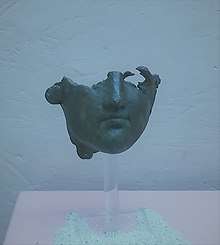Mefitis
Mefitis is the Samnite goddess of the foul-smelling gases of the earth. The Samnites occupied central Italy before the rise of Rome. Mefitis was worshipped in central and southern Italy before Roman times, with her main shrine in the volcano Ampsanctus in Samnium. There was a temple dedicated to her in Cremona, and another on the Esquiline Hill in Rome. It is theorized that Mefitis was originally a goddess of underground sources, such as natural springs—the fact that many of these springs were sulfurous led to her association with noxious gases. She is almost always identified with volcanoes, having been worshipped at Pompeii. Her name, which likely means "one who smokes in the middle", is also seen as Mephitis.

Overview
The etymology of the name Mefitis is controversial but according to the Italian linguist Alberto Manco the system of the epithets that identified the goddess from place to place would prove her relationship with a water-based dimension.[1]
In Roman mythology, Mefitis (or Mephitis; Mefite in Italian) was the Minor Goddess of the poisonous gases emitted from the ground in swamps and volcanic vapors. "Mephitic", derived from Mefitis, is now an adjective in the English language meaning "offensive in odour"; "noxious"; and "poisonous".
In Italian, a mefite is also a solfatara or fumarole (i.e., a gaseous fissure) associated with the Roman goddess Mefitis. The feature giving rise to this term is located in Italy along the Via Appia between Rome and Brindisi. There, the ancient Romans would rest on their travels and pay homage to the goddess by performing animal sacrifices using the fissure's deadly gases. Today, it lies near the village of Rocca San Felice in the province of Avellino (Campania region).[2]
See also
- Avernus
- Mefite of Rocca San Felice
References
- Alberto Manco, "Mefītis: gli epiteti", AION Linguistica 31/2009, 301-312.
- Michele Sisto et al., Geocartographic history of a natural monument of Southern Apennines: the Geosite of Mephite in Ansanto Valley (in Italian), academia.edu, link retrieved on July 1st, 2020.
- "MEFITIS La divinità della transizione". Sanniti Archeologia dell'Antico Sannio (in Italian).